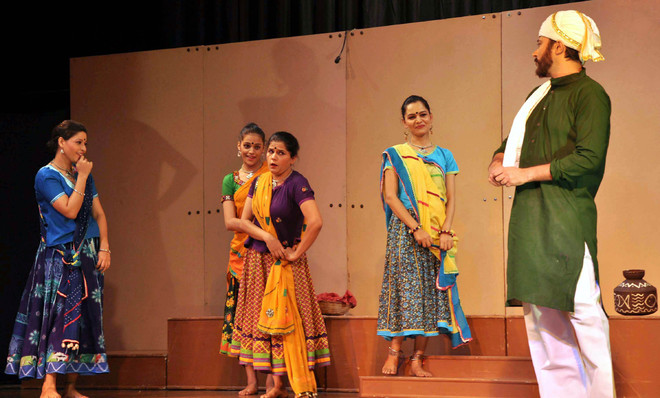Shriniwas Joshi
Close on the heels of Woman Litterateurs Meet arranged by the state academy, the Department of Language and Culture made The Gaiety hum with two plays by the known woman Directors – Nadira Zaheer Babbar from Mumbai and Dr Rani Balbir Kaur from Chandigarh. Nadira had directed a self-written play ‘Jaise sukhe hue phool kitabon mein milen’ and ‘Agni aur Barkha’ written by Girish Karnad was directed by Rani.
Nadira has been bringing her plays regularly to Himachal Pradesh and I saw her first play ‘Jasma Odhan’ at Nahan in 1975. Jasma is a musical play based on Bhavai, the Gujarati folk form. ‘Pencil se Brush Tak’ based on MF Hussain’s journey in the Art World was her last play that I had seen before the present one. The present play instantly crossed the footlights and was clapped by the audience at the right places.
The title of the play has been picked up from the ‘misra’ of a ghazal by Ahmad Faraaz: “Ab ke hum bichhrein to shaayad kabhi khwabon mein milen/Jaise sukhe hue phool kitabon mein milen.”
The play takes the audience to a forgotten library where a lover of literature discovers dumped books wrapped up in clothes. From these bundles rise the poets and writers who make dramatic rendition of their lives and works. Surdas and Mira come alive to sing the songs of love for or separation from Krishna, whom Mira had wedded as a child. Sumitra Nandan Pant’s 'viyogi kavi' born of the anguish of separation was personified here.
Subhadra Kumari Chauhan sings with gusto, “Khoob lari mardani woh to Jhansi wali Rani thi.” The scene epitomised Bal Krishna Sharma Naveen’s definition of poetry: “The power in the words of a poet can raise commotion.” No mention of poetry is complete without the illustrious mystic Amir Khusrau. His use of words is a beauty in itself. Four damsels, once, wanted to test his ability of instant composition of poems (See photo).
They gave him a word each - Kutta, Kheer, Charkha and Dhol. And lo and behold, the couplet was ready: "Kheer pakaai jatan say, charkha diya jalaa; Aaya kutta kha gaya, tu baithi dhol bajaa.” It reminds us of Edgar Allen Poe: "Poetry is rhythmic creation of beauty in words.”
Ghalib comes with his totally different ‘andaaze bayaan’ and his renderings befits the quote of Gulzaar, “If it bleeds, it is but a wound; otherwise everything that hurts is poetry.” Sahir Ludhianvi’s poetry matches with what Sudama Kumar Pandeya ‘Dhumil’ had said, “Kavita, bhasha mein aadmi hone ki tameez hai.” It is known that Amrita Pritam loved him and continued loving him till death but the play disclosed an unknown secret to me that he loved Sudha Malhotra, the singer – alas! She was already married.
I feel inclusion of a few paragraphs of Sahir’s ‘Taj Mahal’ replacing a film-song would have given further depth to the play. A beauty asks her lover to meet her at Taj Mahal and his reply touches the corners of any reader’s heart. He winds up the poem with words, “Daulat ka saharaa le kar, ek shehanshah ne hum gharibon ki muhabbat ka udaayaa hai mazaak, Meri Mehboob, kahin aur milaa kar mujhse.”
Nadira made an appeal that this kind of productions should be shown in educational institutions so that the young, who were gradually losing interest in their culture and languages, get acquainted with the same. How true and genuine is her appeal!
The second play depicts the brutal family feud in which Raibhya, a knowledgeable Brahmin, is malicious and revengeful. Depriving his brother a place among Brahmin scholars, he destroys his nephew Yavakri too when he sees him romancing with his elder son Paravasu’s wife Vishakha. His younger son, Arvasu, wants to join a theatre company and is in love with a tribal girl Nittilai (See photo). He is declared an outcast by the father for these two sins.
The play was directed in the Sanskrit classical style with inputs of modern drama and Cham. Background music, at places, was louder than the voices of the characters on the stage. The combined efforts of the NZCC and the DLC in presenting two plays by the woman directors were appreciated by the theatre lovers.
Tailpiece
All the world’s a stage. Some of us just have better seats.
Unlock Exclusive Insights with The Tribune Premium
Take your experience further with Premium access.
Thought-provoking Opinions, Expert Analysis, In-depth Insights and other Member Only Benefits
Already a Member? Sign In Now










